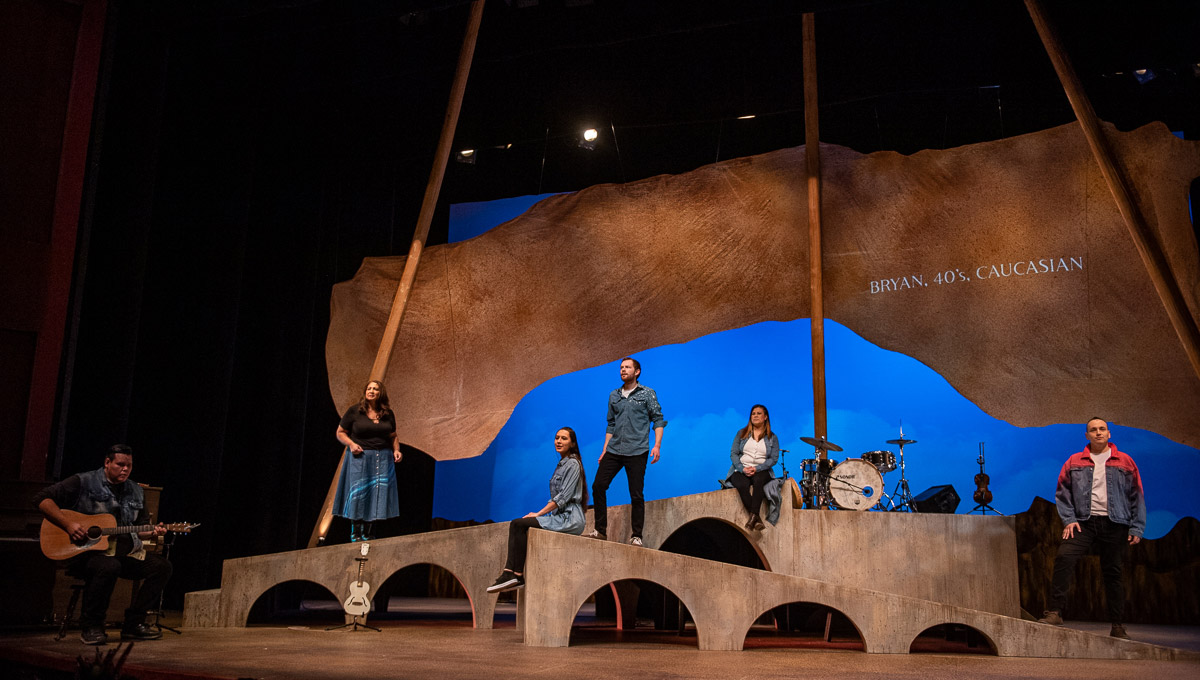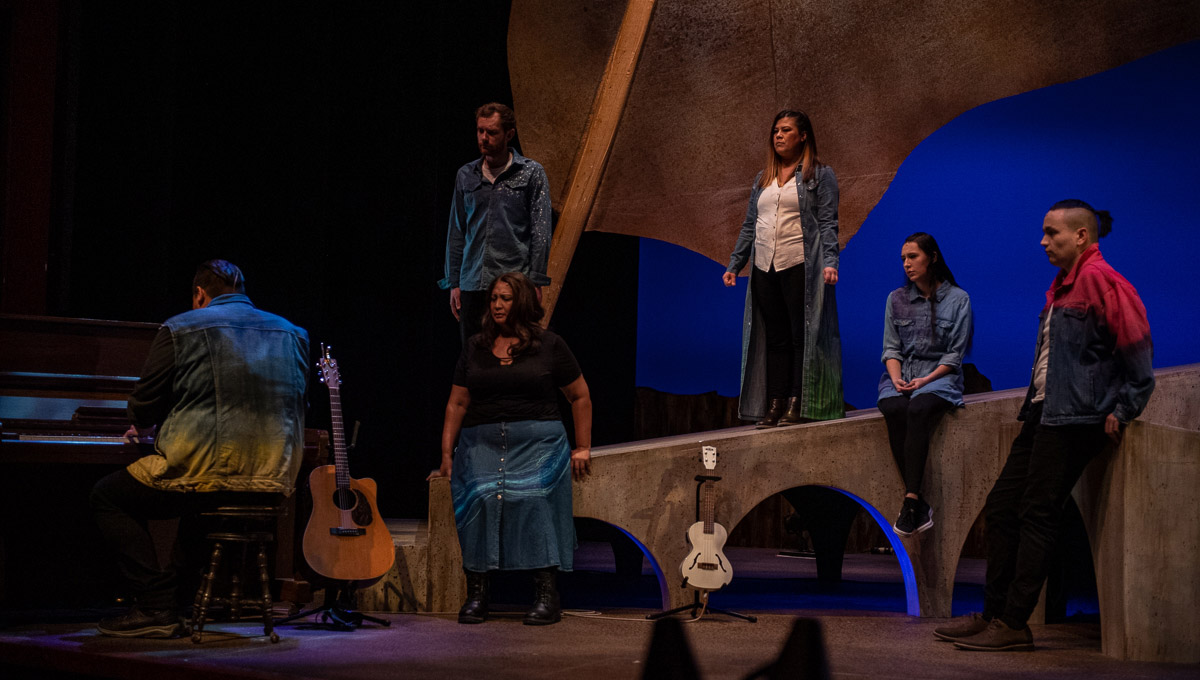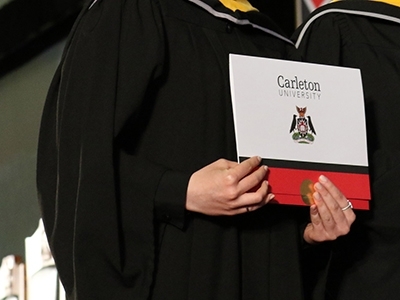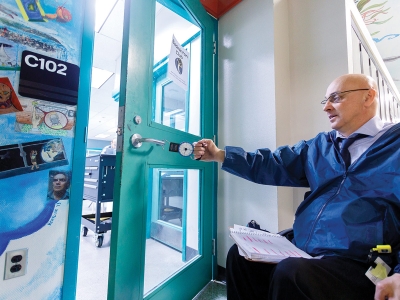By Lisa Gregoire
In an era muddled by fake news, social media echo chambers and mainstream media contraction, it’s perhaps not surprising that the most honest examination of race relations in the Prairies recently unfolded in a Saskatoon theatre.
Reasonable Doubt, a new play about the 2016 shooting death of Cree teenager Colten Boushie by Gerald Stanley—a white Saskatchewan farmer later acquitted at trial—just finished a wildly successful two-week premiere at Saskatoon’s Persephone Theatre and has attracted national attention from politicians, media and interested theatre directors.
The verbatim play by Carleton University alumnus Joel Bernbaum (BJ/2003, MJ/2010) is no ordinary production. It is journalism as art.
The script is comprised entirely of quotes pulled from dozens of interviews and hundreds of pages of trial transcripts, making the play like a live documentary set to music. People say journalism is dead, Bernbaum said on the phone from Saskatoon hours before Reasonable Doubt’s closing night on Feb. 12. But he disagrees.
“Journalism is transforming. And the more we can educate our young journalists to be nimble and to be creative and to think differently, the better they can continue to serve us in the noble way they do.”

The Transformative Power of Theatre and Journalism
If Bernbaum is perched on the cutting edge of new journalism, he has Carleton to thank. Not only did the university approve his unusual Master of Journalism thesis project a dozen years ago—published in 2010 as What They Said: Verbatim Theatre’s Relationship to Journalism—it gave him, “the richest academic experience I’ve ever had.”
He credits much of his current wave of success, and his confidence in exploring the transformative power of journalism as theatre, to his thesis adviser David Tait, who met with Bernbaum weekly.
“We would sit in his office and he would challenge me to think and we would expand our minds together,” Bernbaum said. “I’m forever grateful to him for investing his intellect and his skills in me and my research because inevitably, that’s what has blossomed into these projects … He challenged me to engage with my art and to use my art in a way that connected to the world in a profound way.”
Bernbaum’s first verbatim play, 2014’s Home is a Beautiful Word, commissioned by Victoria’s Belfry Theatre, explored that city’s homelessness through hundreds of interviews with city residents: rich and poor, young and old, homeless and not. After that, Bernbaum got a Saskatchewan Arts Board Independent Artists program grant to interview residents of his home province for a verbatim play on race relations.
At the time, the interviews were polite, almost scripted, Bernbaum recalled. But then Boushie was shot and killed and it tore the bandage off racism and reconciliation in Canada, leaving behind a fresh wound that bled for months. Bernbaum’s interviews changed after that.
“People started speaking with a kind of raw, open-hearted honesty. And they had to speak. Then I knew we had to do this play because it wasn’t about preconceived notions anymore. It was about this moment we were in right now.”
Realizing the subject matter was sensitive and complex, he brought in two Indigenous collaborators. Yvette Nolan helped sift through interviews and choose which passages to include in the script and Lancelot Knight listened to those passages and “uncovered” the music and songs that lay beneath. The collaboration was only fitting, considering the play was about race relations, Bernbaum said.
Six actors in Reasonable Doubt give voice to 63 Saskatchewan individuals, chosen from about 300 interviews. Names were changed to protect identities, except for the people whose names appear in the court transcript. More than 40 people whose voices are heard in the play, attended the play’s opening night, as did Boushie’s family members—active participants from the start—the province’s lieutenant governor and deputy premier, the mayor of Saskatoon and its chief of police. After the first week, every show sold out.

A Kaleidoscope of Voices
Bernbaum used his journalism skills to gather, edit and choose a kaleidoscope of voices and differing opinions for the script, but he failed to convince the Stanley family to participate in the project. However, some of Stanley’s friends agreed to be interviewed and Gerald Stanley “appears” in the play through court transcripts.
Regardless of how audience members felt about the events surrounding Boushie’s death, sitting together and listening to the voices of neighbours they either agreed with or didn’t was a powerful experience, Bernbaum said.
Persephone Theatre hosted a discussion period after each performance and about half the audience usually stayed to discuss issues arising from the play. People so often disconnected by devices, social media and the new politics of polarity and fear, seemed to find a safe place to connect and engage, he said.
“It’s so gratifying to see that people are looking for a way to talk about race relations. Art provides that space for conversation and relationship,” Bernbaum said. Then he quoted Nolan, the play’s co-creator, who said theatre artists don’t have a choice whether to make meaningful art anymore. They have to.
“Being an artist, just like being a journalist, is a privilege and a responsibility. We have the privilege to create and tell stories and to play, and we also have the responsibility to do the best job possible of taking our community and our world a little farther down the path of understanding the people, the issues and the ideas around them.”
Bernbaum is currently working on an interdisciplinary PhD on the potential of theatre to strengthen cities. His next verbatim play, Being Here: The Refugee Project commissioned by the Belfry Theatre, is expected to be staged in February 2021. Based on cross-Canada interviews with refugees and their sponsors, it will focus on the moral and ethical dilemmas of balancing empathy with practicality.
Tuesday, March 3, 2020 in Alumni, Journalism and Communication
Share: Twitter, Facebook



